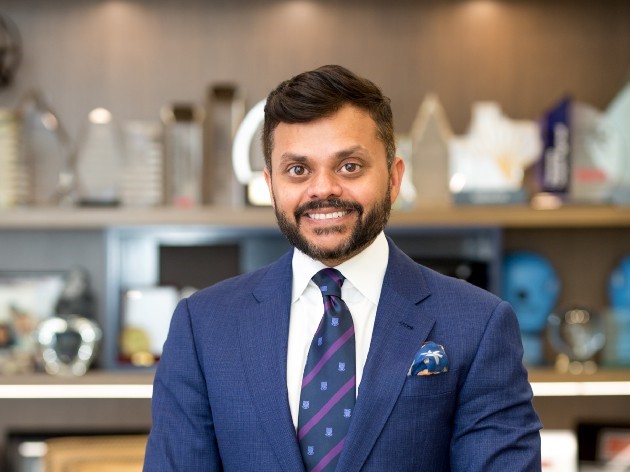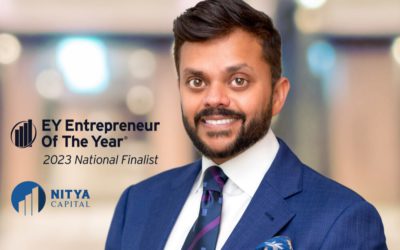Investing During The Pandemic: Swapnil Agarwal of Nitya Capital On What We Should Do With Our Money Considering All of the Volatility and Uncertainty Today

An Interview With Jason Hartman
As a part of my series about “Investing During The Pandemic”, I had the pleasure of interviewing Swapnil Agarwal.
Swapnil Agarwal is the CEO of real estate investment firm Nitya Capital and full-service multifamily management company KPM Property Management. He’s also the founder of the non-profit Karya Kares. Swapnil has 19+ years of financial/investment experience and more than 16 years of experience in real estate globally.
Thank you for doing this with us! Before we dig in, our readers would like to learn a bit more about you. Can you tell us the “backstory” about what brought you to the finance industry?
Coming to America as a teenager, I always felt that I had an eye for business, finance, and most importantly, people. I always seek to explore the little intricacies that make pieces all come together, whether it’s in exploring different solutions in my business practices or simply aiming for new ways to improve people’s lives. My career has spanned across a wide range of diverse opportunities, from my work in private equity at Forum Partners to my earlier years as an investing and banking analyst. I always sought to look for the bigger picture within the world of finance, crafting and honing my skills in a way that is both dynamic and comprehensive. There’s always a reason to expand your horizons no matter where you are in your career. I believe in the big possibilities that shape how we view finance and the economy at large.
Can you share with our readers the most interesting or amusing story that occurred to you in your career so far? Can you share the lesson or takeaway you took out of that story?
I feel as if there are hundreds of intricate, individual stories that take place each and every day within my organization. To name one wouldn’t even begin to scratch the surface. During the pandemic, our resilience and growth signified perhaps the greatest story of all, allowing for our team to branch out, diversify, and expand in our goals for the future. I always try to learn what I can little by little throughout my career, taking potential challenges and incorporating them into our strategy for the years to come.
Are you working on any exciting new projects now? How do you think that will help people?
My team at Nitya Capital has made plenty of great new advancements across our different acquisitions and pursuits. We’ve definitely seen a lot of positive traction in the area of student housing and we feel that this area’s natural, recession-resilient attributes will really help investors get ahead within our current economy. Additionally, we’re taking advantage of opportunities that will help others find a suitable residence for a stronger sense of convenience and service. We’ve made several key renovations across our different properties and we can’t wait to see what lies ahead as we explore new opportunities in the far future.
None of us are able to achieve success without some help along the way. Is there a particular person who you are grateful towards who helped get you to where you are? Can you share a story about that?
None of this could have been achieved without the strength and support of my colleagues, investors, and Nitya family. We’ve really come a long way and I do believe the best is yet to come. During the pandemic, it was through their insight and endurance that we were ultimately able to come out stronger than ever. I’m constantly impressed by how adaptable they are, as well as just how much we’re able to learn from each other every day. I’m so grateful for each and every one of them.
Let’s shift a bit to what is happening today in the broader world. Many people have become anxious from the dramatic jolts of the news cycle. The fears related to the coronavirus pandemic have understandably heightened a sense of uncertainty and loneliness. From your experience, what are a few ideas that we can use to effectively offer support to our families and loved ones who are feeling anxious? Can you explain?
It’s natural that many people feel nervous at this time. We’ve certainly faced a lot of challenges within these past few months, both on a global level, and economic level, and right at home. There’s a great quote out there that many should follow — the more you understand something, the less you shall fear it. Communication and fostering a keen sense of knowledge and understanding are the key to feel more at ease with our current climate. I place a lot of value in taking the time to share a sense of care and goodwill with loved ones, as well as address any major concerns they may be having about the current issues that pervade our society. Express a sense of logic and deduction as you research different areas, look at things across different angles and spectrums. I think that we’re adjusting more and more with each passing day and it’s important that we spread that message of positivity with our teams and families.
Ok. Thanks for all that. Let’s now jump to the main core of our interview. As you know the stock market and the economy, in general, have become extremely volatile and uncertain. Many people “dollar cost average” and put aside a monthly sum into a long-term savings plan for retirement, college, or a home purchase. If a loved one or a client came to you and said, “I have been saving and investing $500 every month in an S&P 500 index fund. Over the next few months until the dust settles, should I be doing something else with my money?”, what would you say to them?
In my opinion, yes. I think the future is very uncertain, because the Federal Reserve is going to keep raising interest rates to voluntarily bring the economy into a recession. When the economy is in a recession, the stock market goes down. That’s not a good place for people to leave their money. I would put that money in real estate, particularly multifamily, because with high inflation, you’re going to get higher rent growth, which means you will make good cash flows. This also includes capital values if you’re able to hold for three years or longer, allowing you to make good profit overall. So, I would take the money out and definitely put it in something savvy like real estate.
Eventually, the economy will recover and rebound. Certain sectors, like travel and hospitality, might be hurting for a while. But other sectors, like technology and healthcare, might do very well. If someone wanted to prepare today to take advantage of the future recovery, what would you suggest they do?
Keep your ear to the ground and don’t be afraid to take risks. Intuition is an invaluable teacher, through trial and error and everything in between. My company and I have seen substantial shifts within the market over the course of the past several months, but we’re confident that keeping your eyes opened for new fluctuations and openings is essential for charging ahead. One benefit of my industry in the world of real estate investing are the industry’s overall recession-resilient attributes, showcased through the constant need for housing and commercial office space. It’s a logical, practical summation and I think it highlights the importance of keeping your eyes peeled for new opportunities.
Are there sectors that provide exciting and lucrative investment opportunities today, specifically because of the volatility and uncertainty?
Again, I would say that real estate is a good asset class to provide a sense of certainty and recession-resilient asset classes, especially within the area of student housing. University enrollment has risen to 22% particularly within the recessionary economy. A lot of people are going back to school after being laid off. A great thing about student housing assets is that they are close to big universities where enrollment is growing and you have their leases being signed by parents, adding to their overall certainty when it comes to occupancy. I would say that student housing is definitely one of the most recession-resilient asset classes that currently exists.
Are there alternative investments that you think more people should look more deeply at?
I specialize in real estate investing. So, I’ll say that real estate is definitely the way to go, even within areas of pandemic-related economic uncertainty. Real estate is very useful in that it can pay in dividends via a potentially considerable monthly cash flow, it can benefit you in the long term, it can help you diversify, and it features a striking potential for rebuilding. I fully see the demand for office space returning with a huge vigor as workers begin to slowly return to their regular office environments. I think there might inevitably be some bumps along the way, but we’ll see where it takes us, especially when it comes to shifting approaches within the workplace when it comes to responding to the pandemic.
If a person in their thirties and forties came to you today and said that they have $10,000 that they want to put away today for a long-term investment, what would you advise them to do with it?
I would advise them to pursue a real estate investing opportunity that involves private real estate transactions. An apartment, hotel, or commercial building are all very useful, impactful areas for investing no matter how you look at it.
Ok, thank you! Here is a more general finance question. You are a “finance insider”. If you had to advise your adult child about 5 non-intuitive essentials for smart investing what would you say? Can you please give a story or an example for each?
There are plenty of things to make note of. First and foremost, especially if you’re someone like me working in the real estate investing industry, ask yourself what are you contributing to. Are you actively working to ensure that all properties are given the tools they need to appear attractive to investors? Are residents happy in their homes? Look for the human element. For instance, our approach with Nitya when it comes to owning a property, we invest in the property to insure we always have a safe, clean place to live and grow.
Second, look for a way to utilize multifamily portfolios as a means of branching out across the community. How do these properties build communities? Contribute to the local economy? What can your organization do to bolster the property’s value to the community at large? If a property leaves a lot of impact towards the community it’s centered in, chances are it holds a lot of intrinsic value overall. For instance, through our nonprofit Karya Kares, we provided rental assistance programs to our tenants during the pandemic. We also provide free healthcare services and other important services for youths in several of our communities. These types of fundamental services are key for enhancing a community.
Third, look for the best possible combinations when it comes to finding the best operator for successful real estate investing. A direct, comprehensive, and communicative relationship is more than often the best place to start, especially if you’re working with a more collaborative mindset for the best acquisitions. Look for experience and express boundaries and find experts who have a history in providing recession-resilient returns. I feel like this attitude is what really helped pave the way for my own company, Nitya Capital, and it ultimately paved the way for investor success. The best working relationships are often dealt with a savvy sense of mutual respect, communication, and expertise.
Fourth, examine all of your parameters. How can you classify whether or not a multifamily opportunity is truly up your alley? How well do you trust your operator? What are the pros and cons in undertaking the project? Always weigh things carefully every time you proceed and make sure you’re working with an operator that speaks to you. At Nitya, our real estate teams carefully vet each asset and use market research and sophisticated tools to ensure each investment is a good deal for us and our partners.
Lastly, always be ready to explore the bigger picture. Think beyond the limitations of what you know. Take chances, feel confident in trying something new. Exploring different cultures, backgrounds, and perspectives are very important for any investor, especially if you’re really looking to get a feel for the community as a whole. I think this trait is highly invaluable as it will help mold you into a stronger, well-rounded investor with a critical eye for what lies beyond. I can assure you that all of my travels and explorations of different communities have helped shape me to the investor I am today.
Can you please give us your favorite “Life Lesson Quote”? Can you share how that was relevant to you in your life?
One of my favorite books is “Whatever It Takes” by Stephen A. Schwarzman. So, I’d like to share a significant quote from the book: “If you’re going to dedicate your life to a business, which is the only way it will ever work, you should choose one with the potential to be huge.” I put a lot of value in this quote as I feel that anyone can tackle the challenges they face and pursue what they really want out of life. I never would have ever imagined that I’d be in the place I am today, but I honestly feel that all things are worth the time and effort it takes to achieve one’s dream. That’s why I value the things that we do within our organization. We are cementing our goals to provide quality services for investors and our communities. And for me, that’s all I could ever want.
You are a person of enormous influence. If you could inspire a movement that would bring the most amount of good to the greatest amount of people, what would that be? You never know what your idea can trigger. 🙂
I believe in having a sense of purpose in everything you do. Have a reason to answer why you’re doing what you’re doing in everyday life. When you have a purpose, everything else becomes irrelevant. The end results or the money you make are all byproducts of your efforts. If you love what you do, and if you’re passionate about what you do, everything else will fall into place in time. I would encourage the younger generation to think about what really counts, which areas they love to explore, what excites them and sparks a sense of creativity and drive. If they stick to their convictions and ambitions, they will find that happiness and success will come their way.
Thank you for the interview. We wish you only continued success!
About The Interviewer: Jason Hartman is the Founder and CEO of Empowered Investor. Jason has been involved in several thousand real estate transactions and has owned income properties in 11 states and 17 cities. Empowered Investor helps people achieve The American Dream of financial freedom by purchasing income property in prudent markets nationwide. Jason’s Complete Solution for Real Estate Investors™ is a comprehensive system providing real estate investors with education, research, resources and technology to deal with all areas of their income property investment needs. Through Jason’s podcasts, educational events, referrals, mentoring and software to track your investments, investors can easily locate, finance and purchase properties in these exceptional markets with confidence and peace of mind.
Starting with very little, Jason, while still in college at the age of 19, embarked on a career in real estate. While brokering properties for clients, he was investing in his own portfolio along the way. Through creativity, persistence and hard work, he earned a number of prestigious industry awards and became a young multi-millionaire. Jason purchased a California real estate brokerage firm that was later acquired by Coldwell Banker. He combined his dedication and business talents to become a successful entrepreneur, public speaker, author, and media personality. Over the years he developed his Complete Solution for Real Estate Investors™ where his innovative firm educates and assists investors in acquiring prudent investments nationwide for their portfolio. Jason’s sought after educational events, speaking engagements, and his popular “Creating Wealth Podcast” inspire and empower hundreds of thousands of people in 189 countries worldwide.
While running his successful real estate and media businesses, Jason also believes that giving back to the community plays an important role in building strong personal relationships. He established The Jason Hartman Foundation in 2005 to provide financial literacy education to young adults providing the all-important real world skills not taught in school which are the key to the financial stability and success of future generations. We’re in a global monetary crisis caused by decades of misguided policies and the cycle of financial dependence has to be broken, literacy and self-reliance are a good start. Visit JasonHartman.com for free materials and resources.
The original article can be found at https://medium.com/authority-magazine/investing-during-the-pandemic-swapnil-agarwal-of-nitya-capital-on-what-we-should-do-with-our-money-db37b953200e






